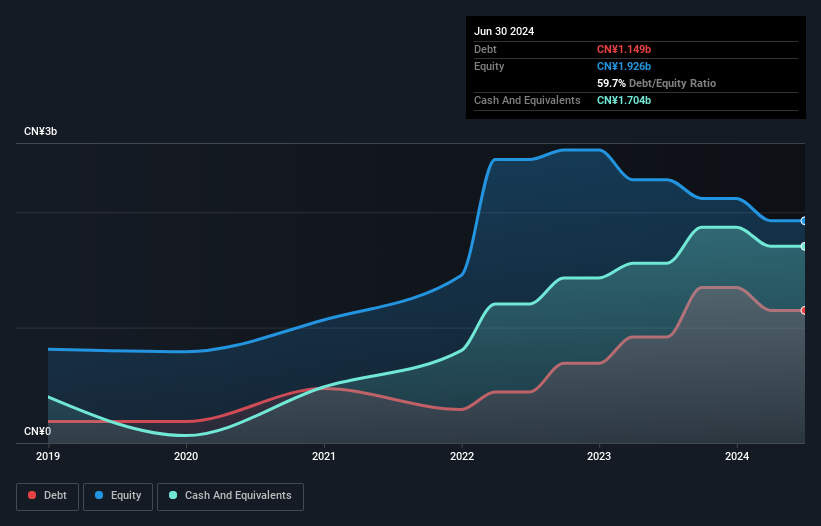
Warren Buffett famously said, 'Volatility is far from synonymous with risk.' When we think about how risky a company is, we always like to look at its use of debt, since debt overload can lead to ruin. Importantly, Yunkang Group Limited (HKG:2325) does carry debt. But is this debt a concern to shareholders?
When Is Debt A Problem?
Debt assists a business until the business has trouble paying it off, either with new capital or with free cash flow. Ultimately, if the company can't fulfill its legal obligations to repay debt, shareholders could walk away with nothing. However, a more frequent (but still costly) occurrence is where a company must issue shares at bargain-basement prices, permanently diluting shareholders, just to shore up its balance sheet. Of course, debt can be an important tool in businesses, particularly capital heavy businesses. The first thing to do when considering how much debt a business uses is to look at its cash and debt together.
See our latest analysis for Yunkang Group
How Much Debt Does Yunkang Group Carry?
As you can see below, at the end of June 2024, Yunkang Group had CN¥1.15b of debt, up from CN¥918.5m a year ago. Click the image for more detail. But it also has CN¥1.70b in cash to offset that, meaning it has CN¥554.8m net cash.

How Healthy Is Yunkang Group's Balance Sheet?
The latest balance sheet data shows that Yunkang Group had liabilities of CN¥1.95b due within a year, and liabilities of CN¥191.8m falling due after that. Offsetting this, it had CN¥1.70b in cash and CN¥1.36b in receivables that were due within 12 months. So it can boast CN¥918.7m more liquid assets than total liabilities.
It's good to see that Yunkang Group has plenty of liquidity on its balance sheet, suggesting conservative management of liabilities. Given it has easily adequate short term liquidity, we don't think it will have any issues with its lenders. Simply put, the fact that Yunkang Group has more cash than debt is arguably a good indication that it can manage its debt safely. There's no doubt that we learn most about debt from the balance sheet. But it is future earnings, more than anything, that will determine Yunkang Group's ability to maintain a healthy balance sheet going forward. So if you want to see what the professionals think, you might find this free report on analyst profit forecasts to be interesting.
In the last year Yunkang Group had a loss before interest and tax, and actually shrunk its revenue by 72%, to CN¥795m. To be frank that doesn't bode well.
So How Risky Is Yunkang Group?
Although Yunkang Group had an earnings before interest and tax (EBIT) loss over the last twelve months, it generated positive free cash flow of CN¥217m. So taking that on face value, and considering the net cash situation, we don't think that the stock is too risky in the near term. With mediocre revenue growth in the last year, we're don't find the investment opportunity particularly compelling. When we look at a riskier company, we like to check how their profits (or losses) are trending over time. Today, we're providing readers this interactive graph showing how Yunkang Group's profit, revenue, and operating cashflow have changed over the last few years.
At the end of the day, it's often better to focus on companies that are free from net debt. You can access our special list of such companies (all with a track record of profit growth). It's free.
Have feedback on this article? Concerned about the content? Get in touch with us directly. Alternatively, email editorial-team (at) simplywallst.com.
This article by Simply Wall St is general in nature. We provide commentary based on historical data and analyst forecasts only using an unbiased methodology and our articles are not intended to be financial advice. It does not constitute a recommendation to buy or sell any stock, and does not take account of your objectives, or your financial situation. We aim to bring you long-term focused analysis driven by fundamental data. Note that our analysis may not factor in the latest price-sensitive company announcements or qualitative material. Simply Wall St has no position in any stocks mentioned.